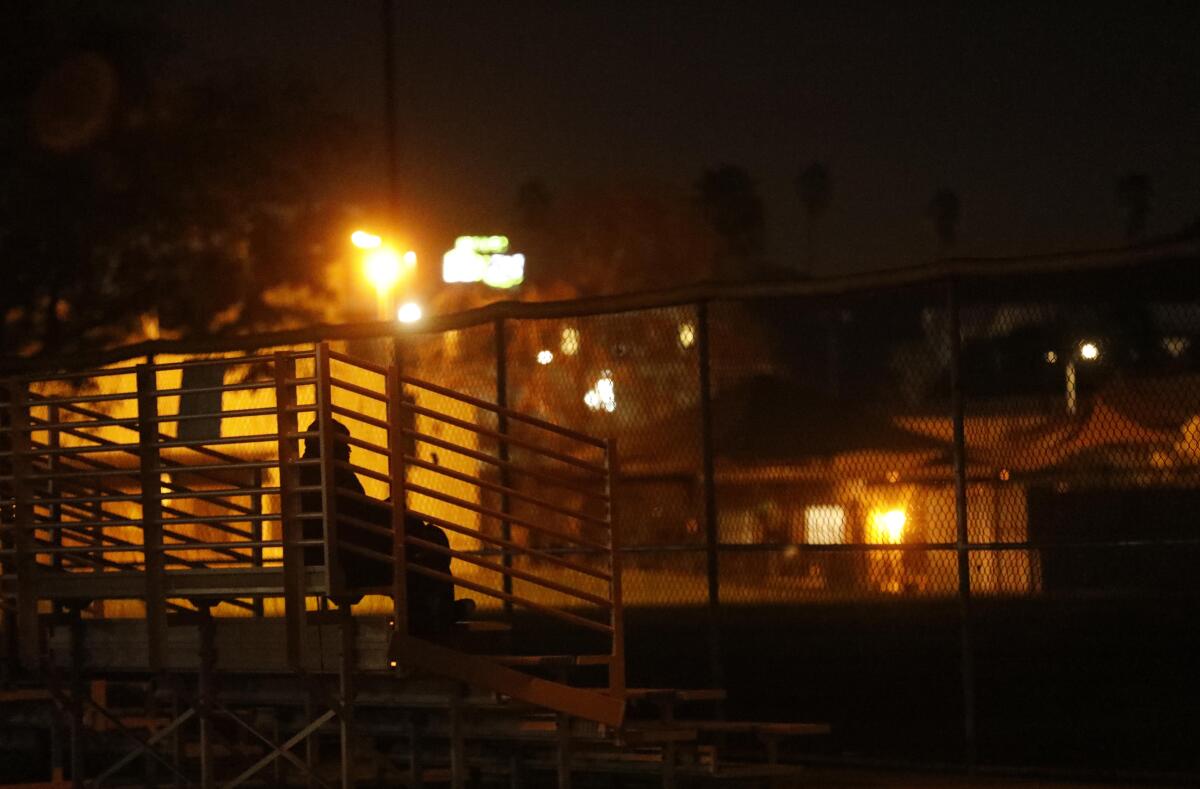Op-Ed: ‘They’ said they had my son. ‘They’ demanded money. So began the days of waiting and crying.

It was a strange number from Huntington Park, but I always answer odd numbers because it could be my son calling. He is 33, unhoused in Los Angeles, mentally ill and treatment-resistant. It’s just something my family lives with, though we never imagined this would be our lives.
When I answered, I heard crying and sobbing, “Mom, Momma, please come get me. Mom, please. Please, Momma.”
I shouted his name, but a different voice answered: “We have your son. He’s been in an accident. He has no phone or ID. I know you want him returned to the safety of your home.”
I tried to stay calm. “My son never has a phone or ID on him. He’s not well. Is this the police? I need to call my husband.”
The man informed me he was not the police, nor did he want the police, or my husband, involved. He went on to say that my son had been eating chicken coming out of a Rite-Aid and saw something he shouldn’t have, got involved and threatened to call the police. He’d cost the man a $15,000 deal. What was I going to do about it?
It was all so plausible. My son getting into someone else’s business on the street, my son causing chaos. If anything, the details of chicken and Rite-Aid made it more believable.
The man told me “they” had my son in the back of a truck, and I needed to come to the Rite-Aid with money. I tried to explain my son’s situation, and that we weren’t rich — as if that would somehow make it all go away.
Then the man identified himself as a member of the Mexican Mafia. His boss was not going to be happy about the $15,000, and if I didn’t do what he said my son would be trafficked to the border and I would not see him again.
I hung up. I stood in the kitchen but was it my kitchen? I felt upside down, hollowed out, blasted by panic. I was positive it had been my boy’s voice, sobbing, and that he was in the back of a truck on the way to the Mexico. I’d hung up on hope.
I called my husband, who said to call 911.
The woman who answered helped me focus, asking questions. Two officers arrived at my house and asked more questions. What could you hear? Which Rite-Aid? Was there the sound of a train? A city street? Was there an accent? I tried to remember everything.
I found myself riding in the back of their police cruiser headed downtown. When we got to the Robbery and Homicide Division at LAPD headquarters, two detectives, Moreno and Moreno (Charles and Helbert) appeared. They had clearly heard stories like mine before. They said they believed the phone call to be a scam — “a virtual kidnapping.”
The script is well known — the desperate cry for help, the demands, and the parent or sister or husband receiving the call is positively convinced their loved one is in danger. They told me an elderly man took a taxi to Bakersfield with money. A mother was sure her daughter had been kidnapped and didn’t believe the officers until the girl was standing in front of her.
For now, however, my phone call would be treated like a real kidnapping. The detectives needed “proof of life.” They wanted to find my son.
The number of the threatening phone call, it turned out, had been created that day by someone with an IP address near Mexico City. They had called back while I was on with 911. No message. The detectives said it was likely the scammers had moved on to another mark.
Still, the two Morenos assembled a team, and we gave them a list of the locations we knew our son frequented. They had to go about it the old-fashioned way, but they also suggested a social media post asking our son to get in touch.
Usually, we connect with him online, but he didn’t answer my texts on Instagram or Messenger, our main way of communicating. So early the next day, I contacted Soma Snakeoil, a founder of the Sidewalk Project, a fantastic organization that works with “those who live outdoors,” distributing harm reduction kits, setting up housing, finding counselors.
We spoke at length and Snakeoil offered to post to her followers and the Sidewalk Project community, asking for help: “ His family is urgently trying to find him. Last seen in Hollywood where he resides on the street. … This is one of our own. ”
I shared the post and so did friends and family far and wide. There was no immediate response.
Then began the days of waiting and crying — a ridiculous amount of crying. My husband and I drove around looking for him. The LAPD team did too. The two Morenos texted updates. People on the street knew our son as Willy Wonka (he looks like Gene Wilder and has a great smile), but nobody had seen him.
When we finally heard from him, four days after the threatening call, he had seen my texts but had no idea about the rest of the fuss. He was annoyed we’d gone to such extremes because people who really were trafficked needed our help, not him. He showed up for breakfast with the detectives (they paid) looking like the Fisher King, in ski boots. They encouraged him to get help. They gave him their cards. Case closed.
During that awful week, one of our other kids sent pictures of her beautiful new son daily. Our youngest called and said, “You should take a walk in L.A., and I’ll take a walk in Chicago, and we’ll tell each other what we see, OK? It’s going to be OK.”
The detectives were kind and empathetic with us and our son, the Sidewalk Project compassionate and humane. Our son’s oldest friends reached out to offer comfort. Even my old boyfriend from high school wrote, “I’m in town for my daughter’s graduation. What do I do if I see your son?”
It was a virtual kidnapping, but the pain and relief were real. So were the help and the hope so many provided. Over and over I’ve had to learn to give our son the dignity to live his own life. And when worry and fear stagger me, I pause, breathe and remember to love.
Kerry Madden-Lunsford lives in Los Angeles and Alabama, where she is a professor of creative writing at the University of Alabama at Birmingham. Her latest book is “Ernestine’s Milky Way.”
More to Read
A cure for the common opinion
Get thought-provoking perspectives with our weekly newsletter.
You may occasionally receive promotional content from the Los Angeles Times.










